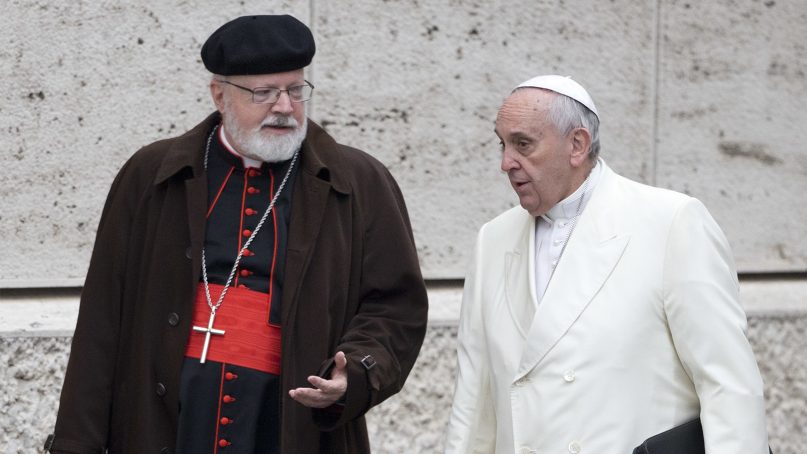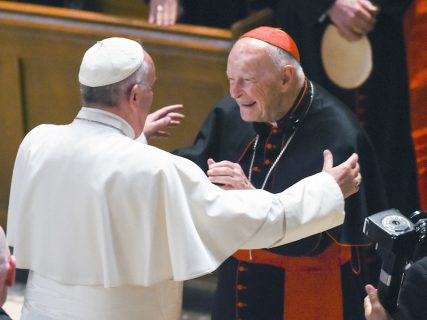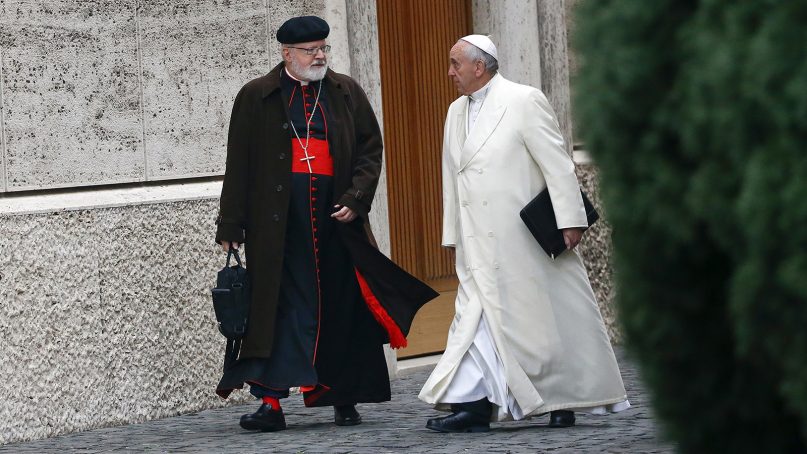
Pope Francis, right, talks with the head of a sex abuse advisory commission, Cardinal Sean Patrick O’Malley, of Boston, as they arrive for a special consistory in the Synod hall at the Vatican on Feb. 13, 2015. (AP Photo/Andrew Medichini)
(RNS) — Roman Catholic Cardinal Sean O’Malley, Pope Francis’ point man on clergy sexual abuse, is calling for an assessment of standards and clearer procedures for bishops accused of misconduct.
O’Malley’s forceful call Tuesday (July 24) comes in response to ongoing news reports that Cardinal Theodore McCarrick, the retired archbishop of Washington, sexually abused a number of boys and men.
Last month, the Vatican suspended McCarrick, saying he had been credibly accused of sexually abusing an altar boy decades ago. Since then half a dozen other victims have come forward with allegations the archbishop abused them, too.
“(W)hen charges are brought regarding a bishop or a cardinal, a major gap still exists in the Church’s policies on sexual conduct and sexual abuse,” O’Malley, the archbishop of Boston, wrote in a statement.
As the head of a papal commission on clergy sex abuse, O’Malley is perhaps the most senior critic of the church’s response to the decades-old scandal. He has long pushed for bishops to be held accountable if they shield priests suspected of sexual abuse. He is also a close adviser to Pope Francis.
O’Malley laid out three specific measures the church should take:
- A “fair and rapid adjudication” of accusations against bishops.
- An assessment of standards and policies of the church “especially in the case of bishops.”
- A communications campaign to make Catholics more aware of the process for reporting allegations against bishops and cardinals.

Pope Francis reaches out to hug Cardinal Archbishop emeritus Theodore McCarrick after the Midday Prayer of the Divine with more than 300 U.S. bishops at the Cathedral of St. Matthew the Apostle in Washington on Sept. 23, 2015. (Jonathan Newton/The Washington Post via AP)
“Failure to take these actions will threaten and endanger the already weakened moral authority of the Church and can destroy the trust required for the Church to minister to Catholics and have a meaningful role in the wider civil society,” O’Malley wrote.
O’Malley was brought in to lead the Archdiocese of Boston in 2002 after the resignation of Cardinal Bernard Law, who was accused of covering up for dozens of priests who had sexually abused minors.
Tim Lennon, president of the board of directors of the Survivors Network of those Abused by Priests, known as SNAP, said O’Malley’s words were a start.
But Lennon added: “It’s taken 30 years to the point where we get a prince of the church to criticize another cardinal. It amazes me that the U.S. Conference of Bishops doesn’t rise up and bishops take on those bishops that have problems or are covering up.”
O’Malley has been railing for tougher sanctions on bishops for at least four years, ever since Missouri Bishop Robert Finn was convicted in 2012 for failure to report concerns about a priest who had child pornography on his laptop.
“Obviously, there has to be consequences,” O’Malley said when his papal commission called for more serious accountability.
To some extent, the Vatican has responded. In 2014, it defrocked archbishop and papal diplomat Jozef Wesolowski for allegedly abusing boys in the Dominican Republic. He died shortly before he was to stand trial before a Vatican tribunal.
Bishop Finn of the Diocese of Kansas City-St. Joseph was forced to resign in 2015.
The church may also be feeling pressure as secular authorities have moved to hold bishops accountable. Earlier this month, Australian Archbishop Philip Wilson was sentenced to 12 months in detention for failing to report the repeated abuse of two altar boys by a pedophile priest.
Meanwhile, the pope’s finance chief, Cardinal George Pell, also an Australian, faces trial in his home state of Victoria on decades-old child sex abuse allegations.
But in other ways, the church’s response to the sexual abuse crisis has been uneven.
Two abuse survivors named as members of the pope’s commission on clergy sex abuse stepped down, frustrated by the reluctance of some in the Vatican Curia to implement recommendations or cooperate with the work of a commission.
Earlier this year, the pope defended a Chilean bishop who sex abuse victims said had covered up the abuse of a diocesan priest. The pope later apologized.
In his statement, O’Malley also defended himself against accusations he did not personally follow up on information sent to him in 2015 by the Rev. Boniface Ramsey suggesting McCarrick had sexually abused seminarians. O’Malley said he did not receive the letter.





